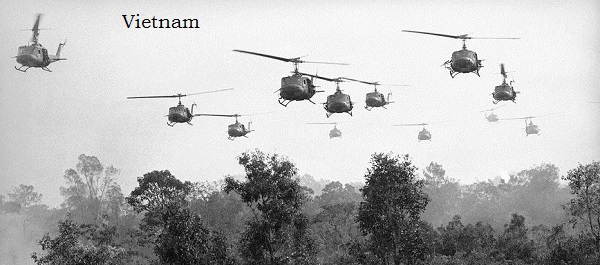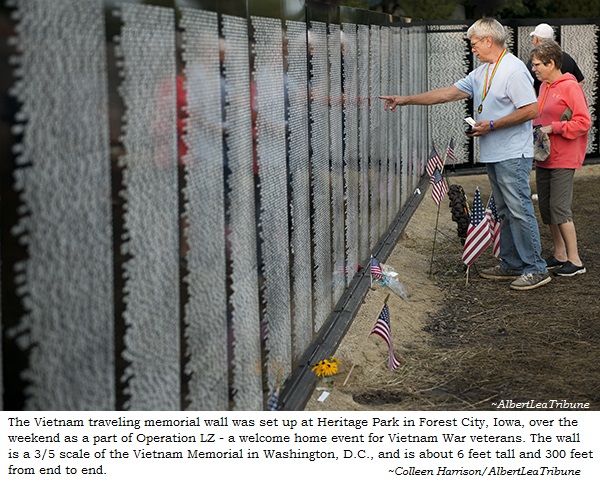


Cerro Gordo County Iowa
Part of the IAGenWeb Project
|
The Globe-Gazette

The Globe Gazette will publish 50 stories — starting on Veterans Day — about North Iowa’s Vietnam Veterans. The stories will appear on Sundays and Wednesdays.
We’ll culminate this "They Served With Honor" project with a special section (publishing on the day before Memorial Day) that will include all of the profiles. It will be great keepsake and resource for family members, educators and part-time historians.
by Mary Pieper, December 20, 2015
"I wake up with it in the morning and I go to bed with it a night," said the former Charles City resident who recently moved to Ionia. Havner, 69 has visited the Vietnam Veteran's Memorial in Washington, D.C., eight times. He also visited the Traveling Memorial Vietnam Wall during Operation LZ this summer in Forest City, an event for Vietnam veterans that he helped organize. He said it is difficult for him to visit the memorial wall with all the names of those who died during the war. "There are so many names on there because I couldn't save them. But that's war," he said. Havner, a 1965 graduate of Charles City High School, went to Mason City Junior College for a year before enlisting in the Navy in October 1966. After boot camp he went to hospital corps school in San Diego, and then Naval Hospital Oakland near San Francisco. He got his orders to go to Vietnam in 1960. As an operating room technician in the First Medical Battalion, "the front was wherever you were," Havner said. They were attacked with rocketsand one night a member of the Viet Cong managed to get inside the wire. "It just wasn't too much fun," Havner said. His duties included triage. One night when casualties were heavy, he was given a black pen and a red pen. The red pen was to mark which of the wounded would be sent to surgery and the black pen was for those would not be treated. He returned to the United States after a year in Vietnam, initially settling in California. Vietnam veterans were not well received when they returned, according to Havner. "I had coffee tossed on me," he said. Another veteran he knows had mustard and ketchup thrown on him, according to Havner. "For some reason they thought we were baby killers," he said. Havner continued to work in the medical field after returning to civilian life. He became a registered nurse, working with premature babies. He returned to Charles City in 2000 and commuted to Rochester, Minnesota, to work at the Mayo Clinic. He retired in July 2010. For many years very few people in his life even knew he was a Vietnam vet, and he never talked about his experiences. That began to change after he became involved with Honor Flight Winnebago, which allowed North Iowa World War II veterans to fly to Washington, D.C., free of charge on a one-day trip to visit war memorials and other landmarks. Havner, who visited veterans who had health issues to make sure they were healthy enough to go on Honor Flights, said they asked him about his own service, so he told them. Havner, who has post-traumatic stress disorder, said his experiences during the war have negatively affected his relationships with others. He has been through two marriages that ended. "I'm not the easiest person to get along with," he said. But ever since Operation LZ, "I'm a nicer person to be around," he said. Looking back on his service in Vietnam, "If they called up today and wanted me to go, I would go again," Havner said. "My nation needed me."
Photograph courtesy of Globe-Gazette
Albert Lea Tribune
By Colleen Harrison

That’s what Vietnam War veterans were meant to receive from Operation LZ at Heritage Park in Forest City over the weekend.
Operation LZ — or Operation Landing Zone — was an idea conceived by a group of north Iowans from nine counties, led by Riley Lewis, Jack Caputo, Mark Frakes, Leon Christianson, Dave Kingland and Bob Havner, who decided to host a local event where all those who served in all services from 1962 through 1975 were honored and thanked. The committee of 25 from the nine counties raised funds from over 100 individuals, businesses and six county governments. Winnebago Industries Rally Grounds, Heritage Park and Forest City Jet Airport also offered the free use of their facilities.
Activities included viewing the traveling Vietnam memorial wall, seeing military aircraft, tethered hot air balloon rides and air shows, among others. The event was meant for veterans to bring family, friends and community to receive honor and thanks.
The Vietnam War was a long, costly armed conflict that pitted the communist regime of North Vietnam and its southern allies, known as the Viet Cong, against South Vietnam and its principal ally, the United States. The divisive war, increasingly unpopular in the U.S., ended with the withdrawal of U.S. forces in 1973 and the unification of Vietnam under communist control two years later, when the war was officially said to have ended. More than 3 million people — including 58,000 Americans — were killed in the conflict.
Lahs, now 72, first enlisted in the Army in 1961 and made a 20-year career out of his service before retiring in 1981. Over his years of service he was stationed in various parts of the U.S., as well as in Germany and Korea. He was first sent over to Vietnam in May 1968 and moved around to various parts of the country until he returned to the U.S. in April 1969.
“That’s not something you forget,” he said, when asked if he could recall the dates of his Vietnam tour of duty.
Lahs was originally trained to operate radar in conjunction with Nike Hercules missiles as a part of air defense. When he got to Vietnam, he said he was involved in air defense for all of three days until he was transferred to a supply unit. He eventually put in for a transfer that would put him in the 8th Battalion of the 26th Artillery, where he worked in a TAB — or target acquisition battery.
To this day, Lahs said he still has flashbacks to being in Vietnam. For years after he was back in the U.S. living with his wife, Mary, she’d tell him of the nights he’d wake her up screaming in his sleep — something he never remembered doing. “I lay in bed and shut my eyes, and I’m back there,” he said. “It takes time… I saw a lot, but you have to keep on moving.”
When Lahs first returned to the U.S., he said he and the other soldiers with him were greeted by protestors who spit on them as they left an airport in Fort Lewis, Washington. Later on, when he eventually tried to join a VFW, he was told by a World War II veteran, “We don’t want your kind.”
Lahs said the stigma surrounding the unpopular war was largely why he, as well as other veterans, didn’t talk about their experiences. For a time, he said he developed a drinking problem as a result of trying to self-medicate. After more than 53 years of marriage, Lahs said he still hasn’t talked about the war to his wife at all, and has only talked about some of it with his adult son once.
He said a good deal of his residual issues from his service weren’t triggered until the start of the Iraq War in the mid-2000s. Lahs dropped about 40 pounds and said he constantly felt depressed and that his flashbacks were more prevalent than ever. In 2005 he was diagnosed with pretraumatic stress disorder, which is similar to post-traumatic stress disorder, but the reliving of traumatic events or episodes occur before the stressful situation ever takes place. Essentially, Lahs was reliving the trauma he survived in Vietnam because he felt the Iraq War was similarly unnecessary and would be increasingly unpopular — similar enough to dredge up old feelings from his combat experience. He was prescribed Prozac to combat the effects.
“This is going to help, a lot,” Lahs said of the Operation LZ weekend. He said he hopes the weekend will help other veterans, of the Vietnam War and others, realize that they’re not alone.
“Join veterans organizations, they’re there to help,” he said. “You don’t have to feel alone, and you can’t do this by yourself.”
Photographs courtesy of Albert Lea Tribune
|
© Copyright 1996-
Cerro Gordo Co. IAGenWeb Project
All rights Reserved.